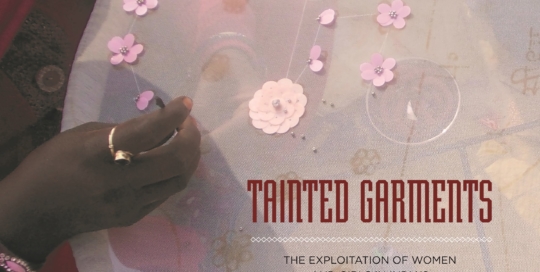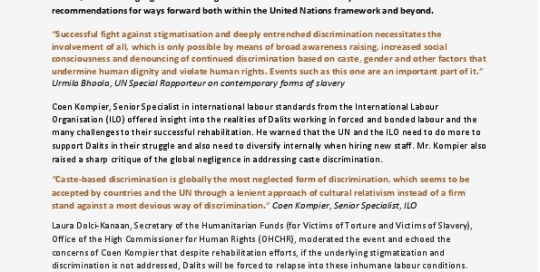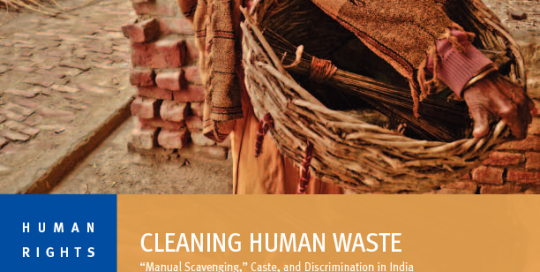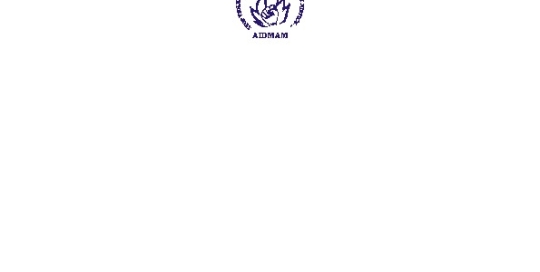IDSN Annual Report 2018
Annual Reports, Bangladesh, Bonded labour, Child labour, Children, IDSN Publications, India, Justice, Manual Scavenging, Nepal, Pakistan, Publications, Slavery, South Asia, United Nations, Untouchability, Women
Download the full report here >>
Tainted Garments: The Exploitation of Women and Girls in India’s Home-based Garment Sector
Bonded labour, Child labour, Children, India, Other key reports, Slavery
Tainted Garments: The Exploitation of Women and Girls in India’s Home-based Garment Sector by Siddharth Kara offers the most comprehensive investigation yet into the conditions of work for women and girls in India’s home-based garment sector. Approximately 85 percent of the home-based garment workers documented for the report exclusively work in supply chains for […]
Report – Caste and Gender-Based Forced and Bonded Labour – UN 2015 Side-event
Bonded labour, Child labour, IDSN Publications, India, Nepal, Other key reports, Pakistan, Publications, Slavery, South Asia, United Nations
Download the report from the HRC29 side-event caste-forced-bonded labour June 2015
Rehabilitating Former Manual Scavengers
India, Manual Scavenging, Other key reports, Publications
Breaking Free: Rehabilitating Manual Scavengers
Manual scavenging refers to the practice of manually cleaning, carrying, disposing or handling in any manner, human excreta from dry latrines and sewers. It often involves using the most basic of tools such as buckets, brooms and baskets. The practice of manual scavenging is linked to India’s caste system where […]
“They Say We’re Dirty” – Denying an Education to India’s Marginalized 
Children, Education, India, Other key reports, Publications
Dalits, Adivasis and Muslims are most at risk of dropping out of school and being denied an education in India – states the comprehensive report “They say we’re dirty” – Denying an Education to India’s Marginalised, just released by Human Rights Watch.
The authors of the report interviewed hundreds of students, parents, teachers and officials […]
Cleaning human waste
India, Manual Scavenging, Other key reports, Publications, Slavery
“Manual Scavenging,” Caste, and Discrimination in India
AUGUST 25, 2014
This 96-page report documents the coercive nature of manual scavenging. Across India, castes that work as “manual scavengers” collect human excrement on a daily basis, and carry it away in cane baskets for disposal. Women from this caste usually clean dry toilets in homes, while men […]
India Exclusion Report 2013-14 – Centre for Equity Studies
India, Other key reports, Publications
Read caste-related selected extracts from the India Exclusion Report or download the full report.
The report analyses discrimination across labour, education and housing in India. Within all these areas Dalits, and particularly Dalit women, come out at the bottom of the tables.
“India is inherently prone to exclusion practices that make large quantities of people extremely vulnerable to a […]
Claiming Justice: A Study of Civil Society Organizations’ (CSO) Interventions in Addressing Atrocities Against Dalits and Tribals
India, Justice, Other key reports, Publications
Read the full report here (uploaded to the IDSN website with the permission of NDMJ)
Nazdeek, a legal capacity building organization committed to bringing access to justice close for marginalized communities in India, in collaboration with the National Dalit Movement for Justice announces the release of the groundbreaking report Claiming Justice: A Study of Civil Society Organizations’ (CSO) Interventions in […]
Violence against Dalit women
India, Other key reports, Publications, Women
Violence against Dalit women (AIDMAM, 2012, Publication)
Justice Under Trial: Caste Discrimination in Access to Justice before Special Courts
India, Other key reports, Publications
A comprehensive 2014 report by the National Dalit Movement for Justice (NCDHR) finds serious obstacles to Dalits obtaining justice in crimes against them and reports growing impunity when victims are Dalits. The report findings mirror many of the findings in the report Claiming Justice – also from 2014.










